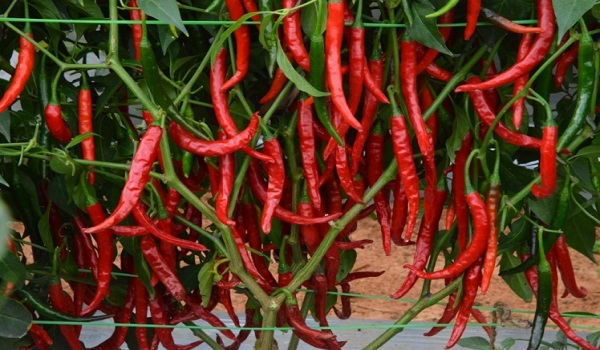The ICAR-Indian Institute of Horticulture Research has introduced a new chilli variety named Arka Nihira, tailored specifically for processing purposes. This innovative variety not only boasts excellent processing qualities but also exhibits resistance against the deadly chilli curl leaf disease and Phytophthora root rot.
Chilli, renowned for its rich vitamin C content and diverse culinary and medicinal applications, often falls prey to various fungal, bacterial, and viral infections, posing significant challenges to its cultivation and yield.
India stands as the largest producer and consumer of chillies globally, with Andhra Pradesh leading the charge with a substantial 36% share in worldwide chilli production. Additionally, Andhra Pradesh accounts for a staggering 57% of the country’s total chilli production and plays a pivotal role in global spice exports, fetching substantial foreign exchange earnings amounting to Rs. 8,429.92 crores, as per data from the Spice Board. Other prominent chilli-producing regions in India include Tamil Nadu, Karnataka, and Maharashtra, encompassing districts like Dharwad, Nagpur, Prakasam, Khammam, Guntur, and Warangal.
Recognized for its nutritional properties and indispensable role in Indian cuisine, chilli requires processing to extend its shelf life, given its highly perishable nature. Value-added chilli products such as dehydrated chilli, powder, paste, pickles, and sauces command higher returns, incentivizing consumers and promoting market demand. The National Institute of Food Technology, Entrepreneurship, and Management, under the Ministry of Food Processing Industries, actively encourages the production of processed chilli products to capitalize on this market trend.
However, the unpredictable climate and prevalent diseases like chilli curl leaf disease and Phytophthora rot pose significant threats to chilli cultivation. Phytophthora rot, caused by the fungal pathogen Phytophthora capsici Leonian, leads to root rot and substantial yield losses, estimated at around US$100 million globally. Additionally, whiteflies and begomo viruses transmitted by them exacerbate the challenges faced by chilli farmers, discouraging cultivation.
Dr. Madhavi Reddy, Principal Scientist at the Division of Vegetable Crops, ICAR-IIHR, highlights the distinctive attributes of Arka Nihira, noting its suitability for both fresh and processing markets, high yield, and characteristic colour change from ark green to red upon maturity. This disease-resistant variety presents a promising solution to mitigate losses and enhance the sustainability of chilli cultivation amidst prevailing challenges.


